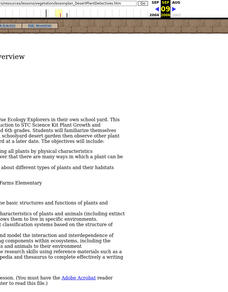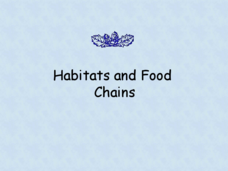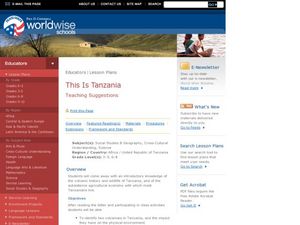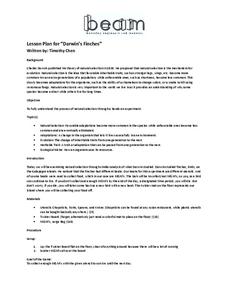Curated OER
Why Care About Amphibian Population Decline and Malformations?
Students examine the reasons for preserving wildlife. They look at reasons for amphibian malformations and write an essay about the ethical issues that this brings up. They listen to the teacher read quotes about extinction and how the...
Curated OER
What Killed the Dinosaurs?
Students demonstrate how scientists use evidence to formulate hypotheses. They write an essay describing the Cretaceous and Paleocene time periods from the point of view of someone living in that time. In addition, they formulate...
Curated OER
Evolution
Students illustrate the results of natural selection by identifying the specific adaptation of an organism that allows the species to survive in that environment. They illustrate the results of natural selection by recognizing examples...
Curated OER
Endangered Species
Students research the issue of species endangerment by exploring threatened animals, their habitats, and the environmental challenges associated with them. They explore the relationships between living things and their environment....
American Museum of Natural History
What's This?: Early Humans
Early humans crafted shelters out of whatever materials they could find. A one-question quiz asks learners to identify the type of bones used to construct the hut pictured in a display.
Curated OER
Natural Selection
Kids act as scientists and preditors in this short natural selection activity; they collect and analyze data, then apply their new knowledge to real-world examples of natural selection. The layout of the worksheet is easy enough to use...
Montana State University
Everest Extremes: Biodiversity
How many animals can live in a climate as cold as Mount Everest's? Find out with a science lesson all about biodiversity. Activities include research, presentations, group work, coloring maps, and a simulation of a food web.
Curated OER
Desert Plant Detectives
Students examine and categorize plants in their own schoolyard desert garden and then observe other plant areas of their schoolyard.
Curated OER
Habitats and Food Chains
Uncover the world of animal habitats, food chains, and the ecosystems with this well-put-together presentation. Each slide contains information and images that represent various aspects related to the ecosystem. Habitat, animal...
University of Kentucky
The Great Spider Debate
Poor, misunderstood spiders! They are feared, disrespected, and detested by many people, yet they do so many positive things. A great addition to any insect unit, learn about some of the more common spiders, while hopefully dispelling...
Wild BC
Bearly Any Ice
After reviewing food chains, your class members participate in an arctic predator-prey game that exemplifies the impact of climate change of food availability. If you are in a hurry, skip this lesson, but if you have the time to...
National Science Teachers Association
Hop into Action
Young scientists find out what makes amphibians such unique and interesting animals in this simple life science lesson. After looking at pictures and discussing the characteristics of amphibians, learners complete a series of three Venn...
Curated OER
Prairie Populations
Eleventh graders practice the Quadrat Survey Technique to analyze the biodiversity of a local plant community. They compare its biodiversity with the documented changes in biodiversity of the tallgrass prairie over time.
Curated OER
Wildlife Variety Show: Biodiversity In Illinois
Eighth graders write a short report in first person about any plant or animal found on a list of Illinois species. They become the character of the plant or animal and give a short report describing the plant or animal.
Curated OER
This Is Tanzania
Students explore Tanzania. In this geography skills lesson, students read This is Tanzania by Richard Lupinsky, Jr. and discuss the impact that volcanoes have had on the nation. Students analyze the imagery in Lupinsky's piece and create...
LABScI
Taxonomy: Who is in My family?
Find similarities in seemingly unlike organisms. The second instructional activity in a series of 12 builds the concept of a taxonomy and explores the use of a dichotomous key. Learners begin in part one by attempting to group a set of...
Curated OER
Wildlife Conservation III
Discuss the importance of wildlife conservation. Learners talk about the animals and plants on the US Fish and Wildlife Services list of endangered and threatened species. Then, they engage in a detailed discussion of the reasons these...
Curated OER
Wildlife Conservation I
Focusing on the wildlife in their area, learners identify endangered and threatened species and what these animals need to survive. While this lesson involves animals in the Long Island area, it could be adapted for use with any area.
Curated OER
Birds, Birds, Birds
Students explore one bird a day and eventually put together a book about each of the birds they learn.
Curated OER
This Is Tanzania
Students study the volcanic history and the wildlife of Tanzania. They examine how most Tanzanians live on a subsistence agricultural economy.
Curated OER
I Wonder What a Pest Is...
Students observe what animals are considered to be pests and why. They conduct a mock trial of a honeybee arguing if it is a pest or not. They determine pros and cons of honeybees to prepare for the trial.
Curated OER
Sato and the Elephants
Students write a persuasive letter to the government of an African country that has elephants as a resource. Students research and debate the pros and cons of ivory use. Students identify the value of ivory products versus the lives of...
Curated OER
Endangered Animals
Students listen to a teacher led lecture on jaguars, their habitats, and how they became endangered. Using a specified web site, they choose an endangered animal to research. After gathering information, students participate in...
Berkeley Engineering and Mentors
Darwin's Finches
Try a twist on the old finch beak and chopsticks activity by using M&Ms on a Twister mat. Spoons, knives, forks, and chopsticks represent beaks and are randomly assigned to your little birds, who must collect as much food as possible...

























